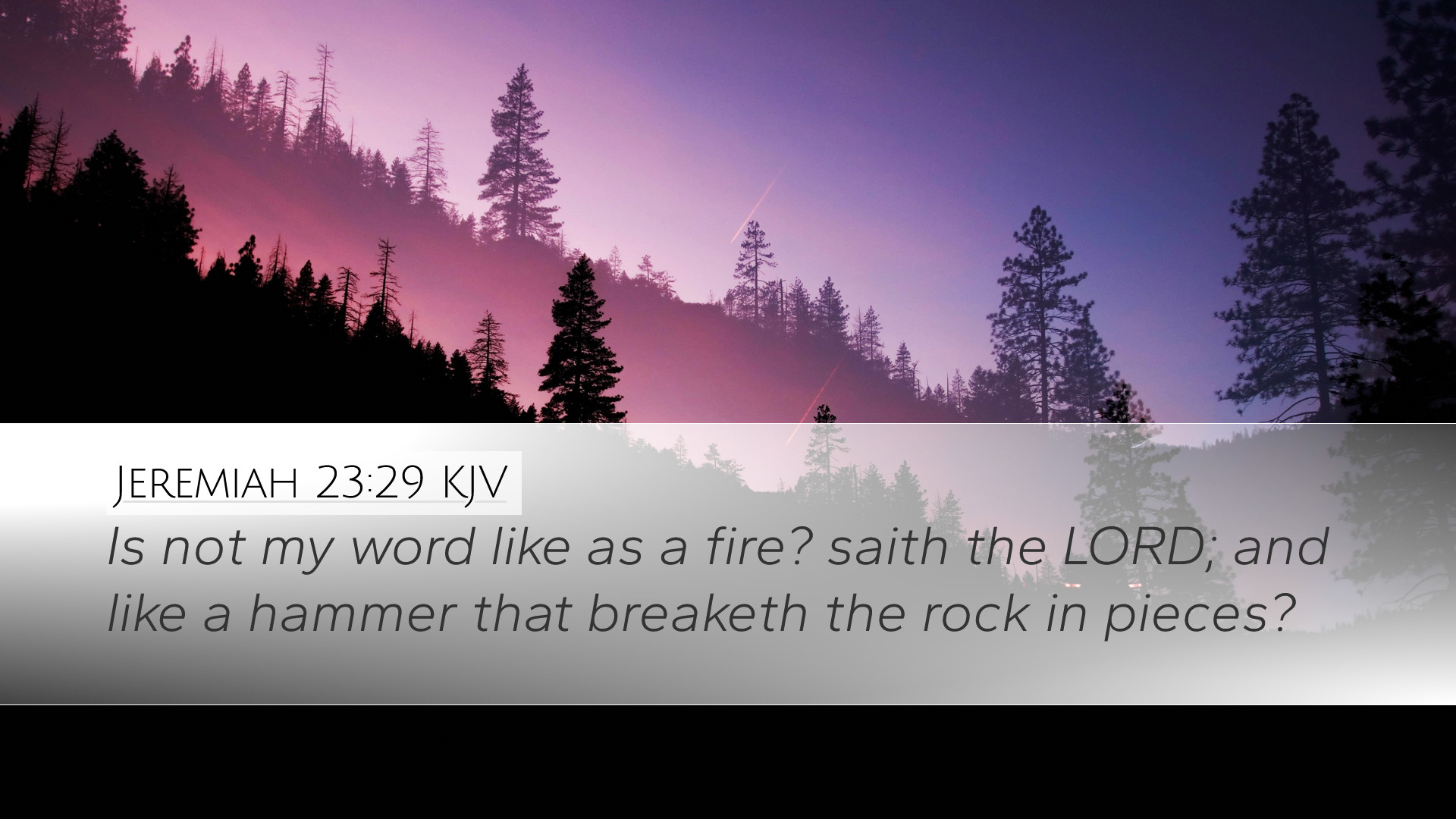Commentary on Jeremiah 23:29
Bible Verse: "Is not my word like fire, declares the Lord, and like a hammer that breaks the rock in pieces?" (Jeremiah 23:29, ESV)
Introduction
Jeremiah 23:29 is a profound verse that conveys the power and effectiveness of God's Word. In this commentary, we will explore insights from several public domain commentaries to provide a comprehensive understanding suitable for pastors, students, theologians, and Bible scholars. The imagery used in this verse reveals the nature of divine revelation and its impact on both the hearer and the world.
Exegesis of the Verse
Matthew Henry's Commentary: Henry emphasizes the metaphorical significance of God's Word as both "fire" and "hammer." The image of fire suggests purification, judgment, and the power to ignite passion and conviction within the hearts of men. Fire is a purifying agent that consumes the dross, reflecting how God's Word approaches the hearts of sinners, urging them towards repentance and holiness.
Albert Barnes' Notes: Barnes elaborates on the notion of God's Word as a "hammer." He describes it as a tool with the capacity to break through the hardest of hearts, illustrating the transformative power of Scripture. Just as a hammer can shape and alter materials, God's Word has the ability to change lives and alter the course of history.
Adam Clarke's Commentary: Clarke addresses the duality present in the imagery of fire and hammer. While fire can cause destruction, it also brings light and warmth. Similarly, God's Word can produce both grace and judgment. Clarke suggests that the application of God's Word can lead to comfort for the believer, while simultaneously serving as a warning for the obstinate sinner.
Meaning and Application
The juxtaposition of fire and a hammer in this verse serves to remind us of the multifaceted nature of God's Word. It operates not only as a means of exposing sin but also as a source of hope and salvation. The psalmist captures this sentiment, proclaiming, "Your word is a lamp to my feet and a light for my path" (Psalm 119:105).
- Purification: Just as fire refines gold, God's Word exposes and purifies our motives, revealing the need for sanctification in our lives.
- Transformation: The "hammer" aspect emphasizes the role of Scripture in breaking down barriers and sinfulness in human hearts, paving the way for transformation and renewal.
- Judgment: It also signifies that God's Word can serve as a measure of judgment, clarifying God's standards for righteousness, and warning of the consequences of disobedience.
- Encouragement: For believers, these metaphors reinforce the idea that God's presence is with them through His Word, providing encouragement and strength amidst trials.
Theological Implications
Understanding the implications of Jeremiah 23:29 requires acknowledging the authority of Scripture. The affirmation that God's Word is like fire and a hammer underscores its divine origin and necessity in the life of a believer. This verse serves as a powerful reminder of God's sovereignty and the efficacy of His divine purpose.
Furthermore, studying this passage raises important theological inquiries regarding the nature of God, His revelation to humanity, and the transformative power of the Gospel. When approached correctly, Scripture invites us into a deeper relationship with Christ, offering growth, wisdom, and guidance.
Conclusion
Jeremiah 23:29 calls us to recognize the immense power vested in God's Word. As both fire and hammer, it serves various roles — purifying, transforming, illuminating, and judging. Pastors and theologians are challenged to present the Word of God with boldness and reverence, aware of its capability to speak into the lives of those who hear it.
In application, believers are encouraged to approach Scripture with openness and a willingness to be molded by its teachings. God's Word, when received with faith, does not return void; instead, it fulfills God's purpose in creating and sustaining life. In this age, when messages of uncertainty prevail, let the church hold steadfast to proclaiming God's Word, for it remains as relevant and potent today as it has ever been.


